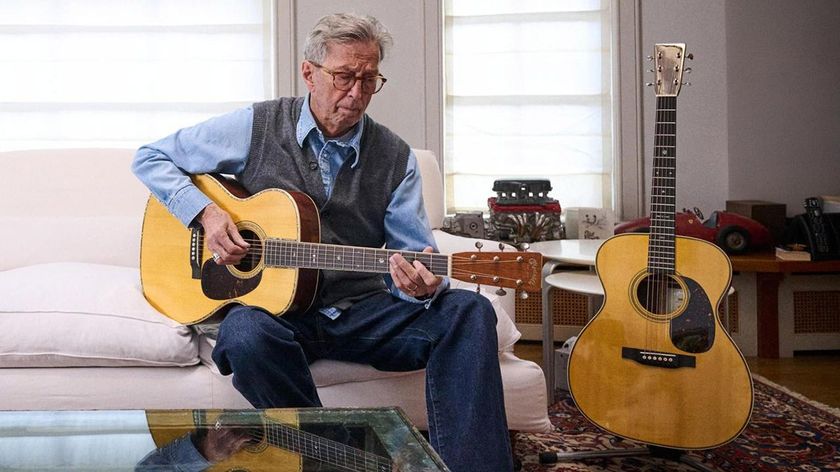Coronavirus: practical advice for musicians - hygiene, contracts and more
You know the drill by now, but here's a reminder, along with some tips for working musos

As the coronavirus crisis escalates, it's easy to feel overwhelmed, but there's plenty of practical advice around, and we'll be updating and expanding this page as events unfold.
If you're a working musician who has been affected by coronavirus, and have knowledge or experience to share, email us on contact@musicradar.com, or contact us on twitter.
Below, we have a reminder of the general advice, plus some tips for working musicians.
1. General advice and info
The main thing at this stage is to follow local public health information and recommendations. Public Health England (PHE) in the UK recommends the following to reduce the chances of catching and transmitting COVID-19.
• Cover your mouth and nose with a tissue or your sleeve (not your hands) when you cough or sneeze.
• Put used tissues in the bin straight away
• Wash your hands with soap and water often – use hand sanitiser gel if soap and water are not available.
• Try to avoid close contact with people who are unwell.
• Clean and disinfect frequently touched objects and surfaces.
• Do not touch your eyes, nose or mouth if your hands are not clean.
The CDC in the US offers much the same advice. For a reliable overview of the current situation and advice, also visit the World Health Organisation coronavirus hub.

2. Coronavirus hygiene advice for musicians
Here's some related advice, specifically for working musicians.
Get the MusicRadar Newsletter
Want all the hottest music and gear news, reviews, deals, features and more, direct to your inbox? Sign up here.
Don't share mics and keep them clean
If possible, use your own personal mic rather than FOH supplied ones. Either way, all mics should be sanitised, ideally using anti-bac product, before and after every use.
Regularly clean any instruments
Clean your instrument thoroughly before and after every gig, ideally with anti-bac wipes or soap and water. As with mics, don't share.
Keep all gear surfaces clean
The above can be applied to speakers, mixers, cables and more. Again, the most important thing when handling anything at the venue is to wash your hands regularly, and try to avoid touching your face with unclean hands.
People
Depressing as it is to write, now is not the right time to be shaking the sound engineer's hand, high-fiving the PR or, sadly, crowd surfing.
For more see proaudioblog.
The UK's Musical Industries association has shared some specific advice around brass instruments, but the principles apply across the board, and when dealing with mics and other gear.
• Don’t share instruments.
• Maintain a good hygiene regime for instruments at all times.
• Clean brass instruments with warm, soapy water and an instrument brush (See Denis Wick trumpet brush here.) The brush MUST be used as it will dislodge any build-up of debris in the instrument. This will prevent any chance of re-infection or cross-contamination.
• Mouthpiece hygiene is essential. Clean the mouthpiece with warm hot, soapy water and a mouthpiece brush. Do not use bleach or any sterilising fluid as this can damage the mouthpiece. A germicide spray, such as Sterisol, is fine, and good for use in a school or shop, but a good clean with washing-up liquid, hot water and a mouthpiece brush is just as effective in killing germs.
3. Contracts and cancellations
Like many workers, professional musicians are facing massive uncertainty, and with so many different ways of working in this business, it's difficult to offer catch-all advice, especially in such a fast-moving crisis.
Obviously, some of the main issues are the likely venue closures and gig cancellations, including corporate work and private functions. As we write many countries are rolling out restrictions on public gatherings.
The Guardian in the UK has a useful summary of current restrictions here.
So, while the below is not exhaustive advice, we hope it can serve as a useful starting point for you if you're affected by cancellations.
In the UK, the Musician's Union has a good round-up of some of the contractual and legal issues involved, covering such issues as...
Force majeure: If you're contracted, do you have force majeure clause, and what does this mean? These clauses exempt parties to a contract from obligations when an unforeseen event occurs.
Doctrine of frustration: If not, does the 'doctrine of frustration' apply? This could have the same effect as force majeure.
Covering loss of income through insurance: There is no such thing as cover for individuals, but your employer or engager could have cover, in which case you're more likely to receive payment.
Accessing benefits (UK): In the UK, you may be able to access sick pay or benefits if you're prevented from working. See the Department for Work and Pensions' latest guidance. This could change or be extended at any moment, as events unfold.
4. Advice for music teachers
The MU also offers the following advice to its music teacher members.
• Avoid passing or sharing instruments between students where possible, especially where instruments come into contact with the mouth
• Clean shared instruments and equipment between uses where possible, e.g. wiping the piano keyboard or mallet handles
• Allow a sensible space between teacher and student(s) and avoid standing or sitting directly opposite each other in close proximity, especially singers
• Air the teaching room between lessons where possible and ensure that hands are washed regularly
• Teachers should follow any guidance or procedures issued by their workplace. If they teach in schools or other settings, they should follow each setting’s policy on what to do if a student presents with symptoms. If a setting has not issued guidance, request it.
• Teachers who work from their own homes or in their students’ homes should follow similar precautions. As these teachers are likely to be self-employed, they will need to be clear on their own policies regarding illness.
• The MU advises that if either teacher or the pupil is unwell with any potentially contagious symptoms, the lesson should not go ahead.
• Self-employed teachers are advised to investigate options for remote teaching. Skype or Facetime can be used for one-to-one or small-group teaching, and teachers are advised to test this out so they can use it if needed.

I'm lucky enough to be MusicRadar's Editor-in-chief while being, by some considerable distance, the least proficient musician on the editorial team. An undeniably ropey but occasionally enthusiastic drummer, I've worked on the world's greatest music making website in one capacity or another since its launch in 2007. I hope you enjoy the site - we do.

“I didn’t even realise it had synthesizer on it for decades”: This deep dive into The Beatles' Here Comes The Sun reveals 4 Moog Modular parts that we’d never even noticed before

“I saw people in the audience holding up these banners: ‘SAMMY SUCKS!' 'WE WANT DAVE!’”: How Sammy Hagar and Van Halen won their war with David Lee Roth


![Chris Hayes [left] wears a purple checked shirt and plays his 1957 Stratocaster in the studio; Michael J. Fox tears it up onstage as Marty McFly in the 1985 blockbuster Back To The Future.](https://cdn.mos.cms.futurecdn.net/nWZUSbFAwA6EqQdruLmXXh-840-80.jpg)






